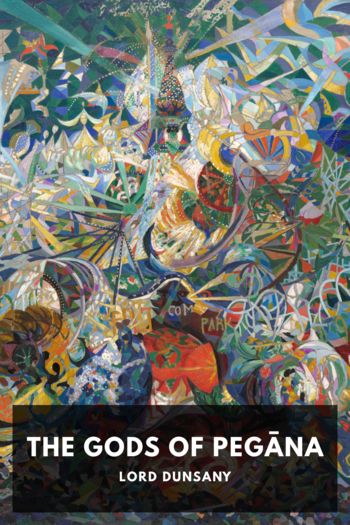It's the End of the World : But What Are We Really Afraid Of? (9781783964758) by Roberts, Adam (reading in the dark .TXT) 📗

Book online «It's the End of the World : But What Are We Really Afraid Of? (9781783964758) by Roberts, Adam (reading in the dark .TXT) 📗». Author Roberts, Adam
The zombie genre has become, in fact, a reaction against the ubiquity of capitalism; the corruption of our minds leads to the corruption of society as these creatures – us – bring the whole system crashing down. As Michael Newton writes, ‘It would appear that we also like to see everything destroyed, Philadelphia overrun by a zombie army, Atlanta’s skyscrapers burned-out. Anything seems better than a thousand years of Tescos.’*
Don’t misunderstand me: capitalism has proven itself a powerful machine for generating material wealth (not at distributing that wealth equally, but let’s put that to one side), and adding all manner of new products and consumer durables and tech and toys to our lives. But even its most enthusiastic supporters would agree that it has done these things at a cost of social cohesion and harmony. We sometimes focus and rely on these ‘things’ more than we do on our personal relationships. We force our bodyclocks into the more rigid timetables of work, stumbling zombie-like out of bed in the morning. We live, increasingly, in isolated urban environments, experiencing loneliness, going through the repetitive motions of modern life.
Aldous Huxley’s Brave New World (1932) is clearly not a zombie novel in the conventional sense, but in this context it absolutely is: in Huxley’s hyper-capitalist ‘utopia’ everybody is (as we would now say) genetically engineered to work, buy things and have sex, to the point where nobody enjoys anything but their work, their shopping and their sex. If people ever feel low, they take a drug called ‘soma’ to brighten their mood. This is the whole horizon of Huxley’s imagined world, and although it is bright and high-tech and its citizens firm-fleshed and good-looking, it reveals itself as a place precisely as soulless, as hunger-driven and as dead as any zombiverse.
In a way the greatest damage capitalism does, as a system, is to prioritise one thing – wealth – over everything else. The pursuit of money supersedes all the values we might say make us human, such as compassion, justice, empathy, honour. The ideal citizen in such a system is driven by an urge to consume, and doesn’t think too long and hard, for instance about who’s in power or what their agenda is.
And that is, perhaps, the secret core of the zombie story. It is not so much the end of the world, but the end of the values that underpinned that world – not the end of humans as a species, but of our very humanity. In the zombie landscape, the moral decay of society is no longer hidden by the façades of our gleamingly intact cities; it is clear to see in the ruinous cityscapes, in the crumbling remains of our ‘civilisations’. The survivors often still try to cling to our traditional social constructs and ideals, banding together in their little communities, helping each other navigate their way through this uncaring, chaotic world. But their attempts to do so are constantly challenged by not only the mindless victims this new order has already claimed but also by other survivors who have enthusiastically embraced the lack of social constraints. The latter are motivated by power and greed, giving in to their baser instincts in the struggle to come out on top. The zombie is not always the biggest monster in these stories; as the critic Eugene Thacker says, ‘the unhuman is more likely to reside within the human itself’.*
It is not only the flaws in our capitalist system that might drive us to this point. Zombie outbreaks have become synonymous with many of humanity’s self-destructive tendencies, from nuclear holocaust to bioengineering. Mira Grant’s ‘Parasitology’ trilogy – Parasite (2013), Symbiont (2014) and Chimera (2015) – creates a near-future world in which humans carry genetically engineered ‘SymboGen’ tapeworms in their guts to enable them to combat disease and obesity; but the law of Frankensteinian unintended consequences means that these tapeworms malfunction, become self-aware and escape their hosts’ bodies, killing some of them and turning hordes of others into ‘sleepwalkers’. In more and more portrayals of the zombie apocalypse, the outbreak is our fault, and we must accept the consequences. As Xavier Aldana Reyes says:
Zombies . . . increasingly, warn of the end of civilisation that may be precipitated by global crises exacerbated by national economic pressures, such as climate change, or by biological warfare. Contemporary zombie texts mark a significant move away from the moment of outbreak as the focal plot point and toward the long-lasting effects of catastrophes for which humans are directly responsible.*
This may also be why zombie films embody a certain hopelessness over the future. As people and resources dwindle, it becomes clear that there’s no going back to their previous way of life. The survivors are just treading water, eking out an existence with no meaning and no real future, alone and abandoned, staring into the face of the inevitable end of humanity. Even if they are able to defeat the plague of the braindead creatures, they’ll be left to contend with their legacy of a ruined landscape. Max Brooks’ World War Z: An Oral History of the Zombie War (2006) tells the story of the zombie apocalypse, exploring how the world has been rebuilt and adapted, but few other stories envision this victory or how a new world could be born out of such destruction. It would be a sad thought if our existential loneliness had reached the state where we cannot see past it.
Grief and loneliness are ghastly things: brain-numbing, flesh-corrupting states that bend our lives around the lines of their force. In the French film





Comments (0)